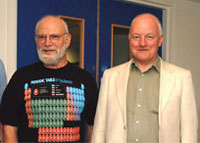What inspired me to become a chemist?
Education
My love affair with chemistry began with a boyhood fascination with fireworks, and that included making my own, which you could do back in the 1950s. It became more intense when I got a place at Keighley Boys' Grammar School where there were two excellent chemistry teachers: Mr Stockdale and Mr Trenouth. In those days they were allowed to perform dramatic experiments – including bangs and flashes – to demonstrate the subject.
I continued into the sixth form for a further two years, now specialising in science, and eventually I won a State Scholarship (£250 per year, equivalent to around £5,000 today) and went to Manchester University to read chemistry (there were no fees in those days). After my BSc I stayed on to do a PhD in inorganic chemistry, researching the phosphazenes (phosphorus–nitrogen ring molecules) under the late Dr Norman Paddock.
Career as a chemist
Having got my higher degree, I then moved to London University (Westfield College) to do two years post-doctoral research on silicon chemistry in collaboration with Professor Bernard Aylett. From there I moved to another London college, King's College, as an assistant lecturer, then lecturer, then reader. My academic career spanned 25 years, during which time I specialised in non-metal inorganic chemistry and very strong hydrogen bonding. Thanks to some very motivated PhD students I eventually wrote more than 100 papers based on their researches (a complete list is here), and in 1984 I submitted my life's work for the highest award that London University can give, and I became a DSc (Doctor of Science).
Career as a writer
This began in the 1970s when I wrote two textbooks, but it was one of these, The Chemistry of Phosphorus, which indirectly launched my second career as a writer. Quite a lot of material that I had collected for that book was not suitable for a scholarly work, so I then wrote an article for the popular science magazine New Scientist entitled 'The Shocking History of Phosphorus' detailing its role in medicine, war, and crime. I was then invited to lunch by the features editor Lawrence McGinty who went through my piece line by line, showing me what I needed to do to make it acceptable to the magazine. This was perhaps the most influential lunch of my life, and at the end of it he invited me to re-write the piece and submit it again. I did so and it appeared as a cover feature.
Slowly at first, but gradually more often, I began to submit new items and other features to the magazine, and by the 1980s I was their chemistry consultant, spending one day a week in their offices. Then in 1990 I was faced with an almost impossible choice: was I an academic chemist or a popular science writer? I chose the former and gave up science writing, but after six months I realised I'd made the wrong choice and decided to leave academic life and become a full-time writer.
However, as soon as I left King's College, I was invited to Imperial College to become their Science Writer in Residence, thanks to Professor Steve Ley. It was my job to produce the department's monthly newsletter as well as writing various booklets for the college, as well as ensuring their research got better coverage in the media. Almost as soon as I left King's College, I was invited by The Independent newspaper to write a monthly column 'Molecule of the Month' and this ensured me a higher profile, and I began to be interviewed for radio.
Eventually I moved to become Science Writer in Residence for the Department of Chemistry at Cambridge University where I performed the same role, this time launching and writing Chem@Cam which is their departmental newsletter. At the same time I became the chemistry consultant for the BACC (Broadcast Advertising Clearance Centre, now known as Clearcast) whose role it is to ensure that all TV adverts were factually correct in the claims they made and I did this job for the next 11 years.
Awards
1992 - Glaxo Award, and Sony Award, for the radio script 'The Shocking History of Phosphorus' written for BBC Radio.
1994 - President's Award of the Chemical Industries Association, for 'Molecule of the Month' published in The Independent newspaper.
1995 - Rhône Poulenc Science Book Prize for The Consumer's Good Chemical Guide.
1997 - Runner-up, BT Technology journalist of the year.
1999 - Royal Society of Chemistry's John Jeyes Medal for environmental reporting.
2000 - Winner of Royal Society of Chemistry Award for Tertiary Education.
2003 - Gesellschaft Deutscher Chemiker (German Chemical Society) Writer's Prize.
2004 - Elected to Honorary Membership of the Society of Chemical Industry.
2006 - First recipient of Society of Chemical Industry Science Communication Award.
Meanwhile I continued to write popular science books about chemistry and that continues to this day. In becoming a writer I was encouraged by people like Oliver Sacks, who turned out to be one of my biggest fans - as I was of his, and especially his books like Uncle Tungsten which explains his love of my science.
 Oliver Sacks – one of my fans
Oliver Sacks – one of my fans- Oliver is a distinguished neurologist. His book Uncle Tungsten details his life-long fascination with chemistry.
Now I have decided to bow to the inevitable and have a website and blog (iChem), the better to reach a wider audience and interact more positively with them.